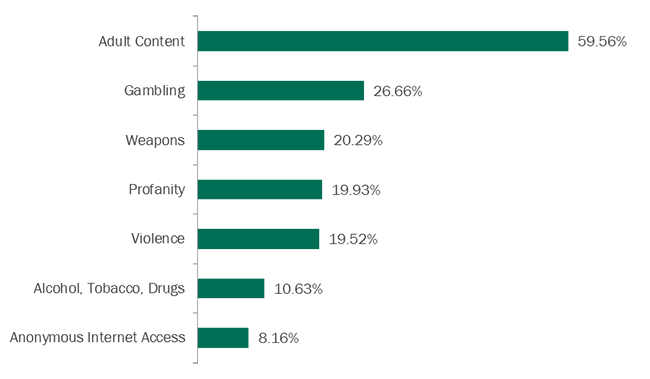The Kaspersky Lab study ‘Children Online’ reveals that in 2014 more than two-thirds (68%) of users of Kaspersky Lab’s Parental Control technologies encountered inappropriate or dangerous content online.
The Kaspersky Lab study ‘Children Online’ reveals that in 2014 more than two-thirds (68%) of users of Kaspersky Lab’s Parental Control technologies encountered inappropriate or dangerous content online. Adult content, gambling and sites carrying information about weapons were among the most prevalent threats detected by Kaspersky Lab’s protection technologies.
The main findings of the report are:
- More than half (59.5%) of users encountered pornography; over a quarter (26.6%) landed on websites dedicated to gambling; every fifth user stumbled across sites featuring weapons; and almost the same number were confronted by strong language.
- Websites carrying this kind of inappropriate content (pornography, gambling, weapons, strong language), along with others featuring drugs, tobacco and alcohol, were the ones blocked most often by Kaspersky Lab protection solutions.
- China, the USA, Germany, the UK and Russia were the countries with the greatest frequency of detections registered by the Parental Control module of Kaspersky Lab’s protection solutions.
The Internet has long ceased to be the preserve of grown-ups. Children today are often far more active Internet users than their parents. But is it safe enough for children to use without fear of facing inappropriate content? To find out Kaspersky Lab decided to investigate potential online threats to children, by analyzing data from users of Kaspersky Lab products equipped with a Parental Control module.

Percentage of unique users who encountered sites included in the dangerous categories in 2014
The results show that more than half (59.5%) of users encountered pornography; over a quarter (26.6%) landed on websites dedicated to gambling; every fifth user stumbled across sites featuring weapons; and almost the same number were confronted by strong language.
Websites carrying these kinds of inappropriate content (adult, chat, gambling and weapons), along with others featuring drugs, tobacco and alcohol, were the ones blocked most often by Kaspersky Lab protection solutions. The frequency of detections demonstrates just how easy it is for users to encounter such content online. The higher the frequency: the greater the probability.
In geographical terms, the countries with the most frequent Parental Control detections were China, the USA, Germany, the UK and Russia. France, Vietnam, Brazil and Algeria also ranked in the top ten in terms of inappropriate content detection – but were relatively safer due to a lower frequency of detection.
Each of the top ten most affected countries has its own distinct characteristics when it comes to the prevailing online threats for children. For instance, adult content was the biggest threat to users in Germany (with 172 detections per user), China (144.18 detections per user), and the US (126.16 detections). Content about alcohol, tobacco and drugs was a major threat to users from Russia, Germany, the USA and France. The frequency of detection was especially high in these countries. This kind of content also proved popular in Brazil and the UK.
“To protect young people, we recommend that adults choose protection solutions with Parental Control technologies and make full use of safe “children” modes in search engines and applications that allow access to multimedia content and which are used by children. However, although Parental Control technologies can block access to web sites with content that is dangerous or distressing for children, they cannot offer reliable protection in situations where safe-by-default web services like social networks or chats are misused by predators or users conducting cyberbullying campaigns. Internet security deserves to be taken as seriously as real-life physical security. That’s why we urge parents to take an active part in their children’s real and digital lives. Only then can they be sure that they won’t miss the moment when their child might need their support.” said Konstantin Ignatev, Web Content Analysts Group manager at Kaspersky Lab.
Read more about online threats to children in full text of the research on Securelist.com.
The Parental Control module for Mac OS X and Windows is included in Kaspersky Lab’s consumer security products Kaspersky Internet Security – Multi-Device and Kaspersky Total Security – Multi-Device. The company also recently introduced a new standalone solution: Kaspersky Safe Kids Beta, which protects kids from inappropriate web content, potentially dangerous apps and other threats on Mac OS X, Windows, Android and iOS devices.
